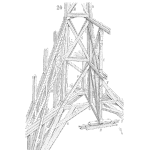
Initially, the CRE Prep blog aimed at providing refresher material for those preparing for the ASQ CRE exam.
In discussions with readers, it has become clear to me that many new to reliability engineering have found the series of articles useful.
That is should not be surprising since many of the tutorials are introductory and practical.
The problem those new to the field have is related with where to start.
There is a lot of information related to reliability engineering.
From defining reliability to working with teams to Weibull analysis, there is a lot to know.
Supporting reliability engineering new to the field
The Accendo Reliability site and the CRE Preparation Notes series of articles are not well organized for someone prepared to learn and not sure what to learn first.
Another issue is it is hard to search for topics being unaware of many of tools and techniques available.
Currently, the articles in the CRE Preparation Notes series have categories and tags related to where the topic fits within the CRE Body of Knowledge. Each article is one of 8 categories:
CRE Prep – which focuses on what to expect, how to study, and related information
Body of Knowledge section I. through VII. which span reliability management to data collection and use.
On the right sidebar of the articles, you can find a listing of the categories and clicking on them takes you to a filtered listing of articles for that category.
At the bottom of each article is a listing of categories that article is listed within.
Every article should be included in the ‘articles‘ and ‘CRE Preparation Notes‘ categories and generally one other specific category related to the body of knowledge or CRE Prep.
Articles shows all articles from all blog series on Accendo Reliability with the most recent at the top.
CRE Preparation Notes shows all articles from the CRE Preparation Notes blog series also with the most recent articles at the top.
There is no particular order the articles are published.
Generally, I write about topics that I receive questions concerning or responses to specific requests.
Also, I try to include articles that cover the full scope of topics concerning reliability engineering.
Getting specific with tags
Along the bottom of each article is also a “Tagged with:” list.
Nearly every article has a tag for the specific clause of the body of knowledge.
Additional support for those new to reliability engineering
With so much new information, this site is a bit overwhelming for those thirsty to learn.
The internal links may quickly lead you to additional topics and after 30 minutes of reading, you have forgotten the original question which brought you to the site.
So, one hint is to have a specific problem you are trying to solve or topic to learn.
Stay with that topic and watch for ‘browser creep’.
If you have more than 5 windows open, it’s time to return to your original topic and hold the other interesting topics for another time.
Over the next few months, watch the site for ‘Guides’.
The initial guide is for those new to reliability engineering and Accendo Reliability.
The idea is to provide a start here page.
A bit of big picture on what is reliability engineering and your role, plus an outline of what is essential you know as a reliability professional. Plenty of links to articles, tutorials, podcast episodes to flush out the guide.
The idea is to provide step by step path to help you know what you need to know.
You may never need to use Mood’s Median Test yet you should know there are ways to evaluate differences between population medians.
At the start, there is a short list of essential bits of knowledge, and the idea for the guide is to outline that information.
Other guides may include a focus on reliability statistics, building a reliability plan, improving your reliability program, or specific focus on different career paths.
Plus, probably should include a guide is for those actually preparing for the CRE exam, the original focus of this blog.
The CRE Preparation Notes has hundreds of articles with a new one added each week.
The tally articles on Accendo Reliability continue to grow and strive to provide the professional development material you need today.
The addition of start here pages or guides is a great idea that is overdue.
Let me know what you would like to have in the guides.
What will help you in your situation today?
Also, if you know of any examples of useful guides or start here pages (any topic), please pass that along so I can learn how to craft and provide useful and practical organization of the information you need.
Leave a Reply